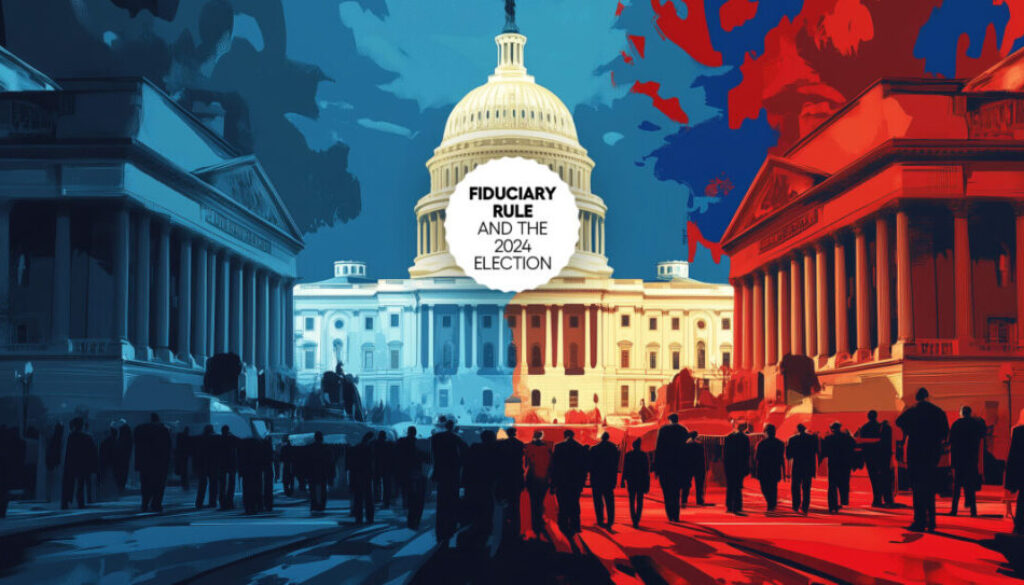Next president might control fate of DOL fiduciary rule, analysts say
The race for the White House is heating up, with Donald Trump and Kamala Harris trading soundbites on hot-button issues from immigration to taxes to the economy in general.
Another issue that likely won’t make any of the seemingly endless hours of political commercials to come before Nov. 5, but an issue whose fate likely rests with the winner, is the Department of Labor Retirement Security Rule.
In late July, a pair of Texas judges issued similar stays freezing the RSR, which establishes a fiduciary duty for nearly all annuity sales. The rule was to take effect on Sept. 23, but the stay means nothing happens until the merits of the two lawsuits are decided.
Given the comments made by the judges in granting the stay, the DOL seems likely to lose the case, said Brad Campbell, partner with Faegre Drinker Biddle & Reath. Campbell and fellow Drinker Biddle partner Fred Reish hosted their latest “Inside the Beltway” webinar last week, devoting most of the hour to the fate of the RSR.
“The question is, will that happen before Jan. 20?” Campbell said. “And if it doesn’t, then the next administration will decide whether to appeal [and] how to appeal. So, the course of the litigation probably does depend, in some part, on the presidential election.”
Don’t be overconfident
The DOL Retirement Security Rule was published April 25 in the Federal Register. It extends a fiduciary standard of care to most annuity transactions. The Federation of Americans for Consumer Choice, joined by several independent insurance agents, filed a lawsuit in the Eastern District of Texas. A group of industry trade associations filed a similar lawsuit in the Northern District of Texas.
Campbell and Reish warned industry opponents of the RSR: don’t be overconfident. If it loses in district court, the DOL is likely to appeal to the Court of Appeals for the Fifth Circuit. The Fifth Circuit vacated the previous fiduciary rule put forth by the Obama administration DOL.
The department has a couple of options for any appeal, Campbell explained. Depending on how the district court judge rules, the DOL could directly appeal those issues.
Both lawsuits make essentially the same argument: that any DOL fiduciary rule must abide by the precedent set by a 2018 ruling from the Fifth Circuit.
With that decision, a three-judge panel ruled that the 2016 fiduciary rule strayed too far from the common-law definition of the term fiduciary, which hinges on the existence of a relationship of “trust and confidence” with the client. Agents who merely sell products to their clients do not have this relationship, the court concluded.
“One of [the DOL’s] arguments is, ‘We’ve changed the new rule, the 2024 rule, enough to work with the Fifth Circuit’s decision,'” Campbell said. “So one argument is, ‘We think we are consistent with the Fifth Circuit,’ and they could ask the Fifth Circuit to ratify that, ‘Yes, they are,’ even if the district court said, ‘No, you’re not.'”
Hey, you made a mistake
The DOL’s second appeal option is a more intriguing gamble. Government attorneys could ask the Fifth Circuit to review its 2016 decision, known as an en banc review. Whereas a normal appeal of a district court decision is heard by a three-judge panel, an en banc review is heard by all of the judges in a particular circuit, Campbell noted.
The Fifth Circuit voted 2-1 to vacate the 2016 fiduciary rule.
“So, the DOL would have to engage in some, to use a term harking back to the Bush administration, some ‘strategery’ in figuring out how they want to approach the appeal, what issues they’re presenting, and whether they want to ask for the Fifth Circuit, or the whole Fifth Circuit, to appeal that decision,” Campbell said. “There’s a lot more legal drama here to come.”
Complicating matters is the Supreme Court’s recent decision to overturn the so-called Chevron deference. The 1984 Chevron decision required federal courts to defer to reasonable interpretations of ambiguous laws by administrative agencies. This meant that even if a court would have interpreted a statute differently, it had to defer to the agency’s interpretation.
Even if it loses at both the district court and the Fifth Circuit, the Labor Department could appeal to the Supreme Court, Campbell pointed out.
“I mean the Supreme Court historically has sort of liked ERISA cases,” Campbell said. “Every 12 to 18 months we get a material ERISA case out of the Supreme Court. So, it’s not as though the Supreme Court would automatically say ‘No.'”
© Entire contents copyright 2024 by InsuranceNewsNet.com Inc. All rights reserved. No part of this article may be reprinted without the expressed written consent from InsuranceNewsNet.com.
The post Next president might control fate of DOL fiduciary rule, analysts say appeared first on Insurance News | InsuranceNewsNet.




